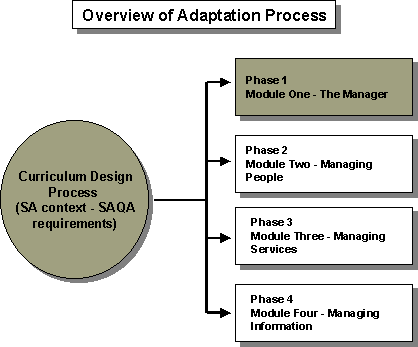
| Randell, C and Radinku, M (July 2000) ' SAIDE adapt a health management programme for
Southern Africa' in SAIDE Open
Learning Through Distance Education, Vol. 6, No.2, SAIDE: Johannesburg
|
||
| Southern African Global Distance Education Network - South Africa Page | SAIDE Homepage | Contents |
SAIDE has been commissioned to adapt the highly acclaimed Managing Health Services programme, which has a proven track record in England and other parts of the world. The aim of adapting the programme to reflect local and regional realities is to make this high quality practice-based opportunity widely accessible to health professionals in Southern Africa. It is hoped that the programme will contribute significantly to tackling the critical need of strengthening management capacity in the health sector in this part of the world.
The Managing Health Services Certificate Programme was originally developed by the Open University in the United Kingdom in conjunction with the NHS (National Health Service) and the Institute of Healthcare Management some ten years ago. Since then, thousands of health professionals and managers have used the programme to develop their management capability.
During 2000, the programme is being replaced with a revised version called Managing in Health and Social Care. The revision is being carried out by the Open University and brings the programme in line with the current climate of change in health and social care. In South Africa, we are fortunate that our adaptation coincides with the most recent updating of the programme.
Features of the new Management Education Scheme by Open Learning (MESOL) Health and Social Care programme are outlined below.
- It is targeted at the first-line manager, especially those moving from a professional or clinical focus to a role that now includes management responsibilities.
- The content reflects an holistic approach to health management. It takes, as a starting point, the importance of front-line managers to quality of care and focuses on good management practice in the context of health, social care, and the voluntary/independent sector.
- Still present is the practical toolkit of management approaches and methods, based on sound management principles and concepts, which enable managers to deal with everyday issues and challenges.
- It uses open learning approaches to support practice-based learning so that managers are able to build their skills in the workplace.
In England, the programme is one of several that are made available by MESOL. This organization is responsible for ensuring that high quality learning materials are delivered through accredited centres that aim to integrate theory and working practice.
Students can also register for the health management programmes through the Open University Business School.
The MESOL Managing Health Services programme is not unknown to health managers in South Africa. Since 1996, some 600 health and welfare professionals have already participated in the programme in different parts of the country, including the Free State, the Northern Cape, Gauteng, Northern Province, North West Province, and Mpumalanga.
The National Department of Health in South Africa expects this management capacity building initiative to make a major contribution to transforming a divided and inequitable healthcare system. The Department for International Development (DfID) has funded implementation of the programme in some centres and is also sponsoring the adaptation process.
SAIDE envisages the adaptation process to take place in four phases as illustrated in Figure 1. During phase one, which started in May 2000, we plan to develop an overall curriculum that incorporates contextual priorities and meets the requirements of the South African Quality Authority (SAQA). As part of this phase, we expect to complete adaptation of module one by November 2000.
The development of the South African curriculum started with a conference of ‘stakeholders’, held in Johannesburg on 9th May 2000. The aims of this important meeting were: to inform people about planned adaptation of the programme; to elicit contextual priority areas for inclusion in the adaptation; and to establish a small working group drawn from the stakeholder reference group.
This reference team will play an important role in ensuring that adaptations accurately reflect issues and challenges facing health managers in Southern Africa. In the next issue of OLTDE, we will report on the curriculum design process and progress we have made in adapting the first module.

| Southern African Global Distance Education Network - South Africa Page | SAIDE Homepage | Contents |
South
African Institute for Distance Education |
||